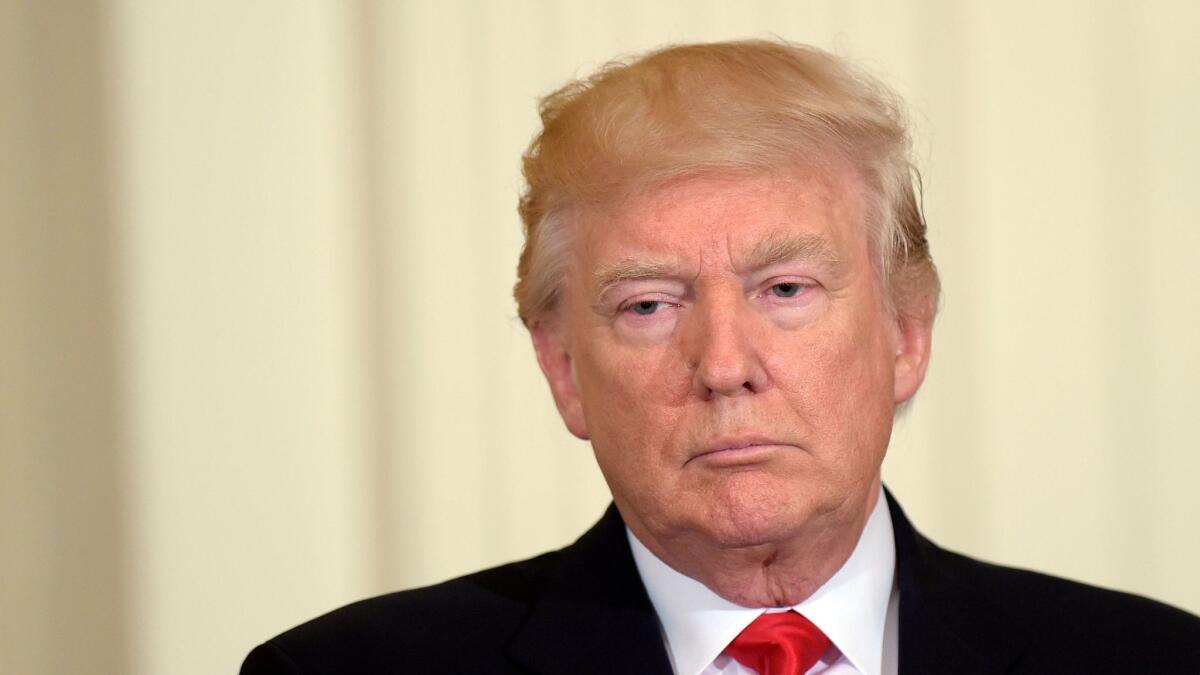Column: Trump’s dangerous credibility gap

When Donald Trump was merely a real estate mogul, he exaggerated flamboyantly and reporters considered it charming: He promoted Trump Tower as a 68-story building, even though it has only 58 floors. When Trump was a presidential candidate, he lied enthusiastically, but that didn’t prevent him from winning: He insisted falsely that he opposed the Iraq war from the start, to cite only one of many instances.
Now Trump is president, and his old habits haven’t changed. He’s still spinning bald-faced untruths whenever it suits his purpose.
The difference now is that the stakes are higher, and the lies more consequential. Earlier presidents husbanded their credibility as a precious commodity; not Trump. His modern predecessors from Lyndon B. Johnson to Barack Obama needed years to open a “credibility gap”; Trump produced his in record time. That’s not merely a problem of ethics or integrity; it’s a practical problem too. Trump doesn’t seem to know it, but he’s hurting his ability to govern.
As one of Napoleon’s aides said under not-quite-similar circumstances, this is worse than a crime; it’s a blunder.
In the next battle over the Russia investigation, Trump won’t get the presumption of truthfulness, because he’s thrown it away.
The tall tales began on Inauguration Day, when the president celebrated record crowds that weren’t. He said President Obama wiretapped his campaign; his intelligence agencies say that’s not true. He said his approval of the Keystone XL project requires that the pipeline be built with American steel; it doesn’t. And so on.
The most current example, of course, is the ever-changing story of why Trump decided to fire James Comey as director of the FBI.
Initially the White House said Comey was fired because the deputy attorney general reviewed his performance and ruled that he had mismanaged the investigation of Hillary Clinton’s e-mails.
Then it emerged that the deputy, Rod Rosenstein, didn’t volunteer; he was ordered to write a memo. And that Comey was fired not because of the Clinton investigation, but because he had lost the president’s confidence months ago.
Next Trump, in an interview, admitted that he had wanted to fire Comey all along; Rosenstein’s recommendation was merely window-dressing. And he said he had Russia in mind too. “When I decided to just do it, I said to myself … [this] thing with Trump and Russia is a made-up story,” the president told NBC News.
But before he changed his story, Trump sent underlings out to spin on his behalf, including Vice President Mike Pence. Pence spent an evening earnestly telling reporters that Comey was fired solely on the basis of Rosenstein’s recommendation — only to have Trump pull the rug out from under him. (That was Pence’s second unfortunate experience fronting for the administration; in January he defended national security adviser Michael T. Flynn against charges of secret dealings with Russia — but the charges turned out to be true.)
Senate Majority Leader Mitch McConnell and House Speaker Paul Ryan dutifully echoed the White House talking points too. They put their reputations on the line on Trump’s behalf.
By way of explanation, Trump tweeted that “with lots of things happening,” his surrogates can’t be expected to provide accurate information. That would seem to make his press officers, who also spread the false account, a waste of taxpayer money.
The consequences go beyond bruised feelings.
A prominent Republican lawyer and former Trump campaign aide, A.B. Culvahouse Jr., said the episode “both prolongs the FBI/DOJ investigation and undermines the credibility of the Trump campaign’s denials of no conspiracy with Putin.”
A few other Republicans are now carefully keeping their distance from White House talking points. Sen. Richard Burr, the chairman of the Senate Intelligence Committee who is leading an investigation into Russian interference, said pointedly that he does not agree with Trump’s assertion that Comey lost the confidence of the FBI.
The episode also raises the bar for Trump’s nominee to be the next FBI director. Republicans as well as Democrats will ask for assurance that the next chief won’t be a White House stooge.
More immediately, if Rosenstein, Comey or Comey’s successor accuse Trump of trying to impede the investigation, who will believe the president? In the next battle over the Russia investigation, Trump won’t get the presumption of truthfulness, because he’s thrown it away. He will look for allies, but he may find fewer who are willing to stand up for him.
It’s not surprising that Trump didn’t change his ways when he arrived at the White House. Playing fast and loose with the truth had always worked for him before — and, to many who knew him, that seemed an integral part of his personality.
But it may not be working any more. Trump has diminished his own influence as president, and may not even know it.
Twitter: @DoyleMcManus
Follow the Opinion section on Twitter @latimesopinion or Facebook
MORE FROM OPINION
Punishing businesses for working on Trump’s wall is foolish and wrong
President Trump is behaving a lot like someone who colluded with Russia
Spineless Republicans abdicate their responsibility to keep Trump in check
Trump doesn’t want to be president, he wants to be emperor
More to Read
A cure for the common opinion
Get thought-provoking perspectives with our weekly newsletter.
You may occasionally receive promotional content from the Los Angeles Times.











